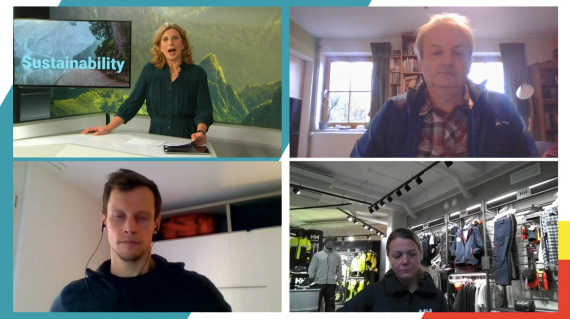
The European Union wants to be the first continent to become climate neutral - by 2050, according to the "European Green Deal" presented to the public by Ursula von der Leyen, President of the European Commission, in December 2019. The Commission has declared the textile industry to be one of the priority areas. In order for the EU target to be realistic, it should recycle more and produce less waste, in short: focus on a circular economy. At the same time, its products should become more durable, repairable or reusable.
Three experts from the industry discussed this on the last day of ISPO Munich Online:
Rebecca Johansson, Sustainability Manager at Norwegian foul-weather clothing specialist Helley Hansen,
Julian Lings, Senior Sustainability Manager at New Zealand merino wool leader Icebreaker, and
Jan Lorch, Sales Manager at outdoor equipment supplier Vaude.

One thing is certain: a goal that affects the entire industry requires collaboration and joint action. "Sustainability has become a fundamental concern for many, many brands in our sector," says Lings of Icebreaker from New Zealand. "We have the big targets right in front of us now, the Green Deal affects us all." He said the launch of the concept in Glasgow was a defining moment for the entire textile industry. "Over the next ten years we will have to change it radically."
But change is not just to be driven in Europe, but everywhere, Lings said: "Our industry is important to the whole world." He was therefore pleased with the change of power in the US, he said: "Those were tough years for the US. But Joe Biden's announcements regarding climate protection are a really good sign."

The outdoor industry is certainly further ahead than other sports sectors when it comes to sustainability and climate protection. But for Rebecca Johansson of Helley Hansen, that's no reason to rest on our laurels: "We're already doing a pretty good job and have changed a lot. But it's only just begun." The Corona pandemic had shown that "we should listen to the scientists", she said in Norway. "2050 sounds far away at first, that's 29 long years. But it is essential to radically reduce CO2 emissions already in the next nine to twelve years - the urgency is there and we can't press the pause button now!"
What is happening right now with the EU's Green Deal and Circular Economy Action Plan is "a clear signal", Johansson thinks. "It's not just about the climate, but also about the circular economy and diversity. We should take the opportunity that we now have a legal framework for this." At Helley Hansen, sustainability has long been important: "After all, our products are used in the most beautiful places in the world."
"We now have a requirement from the EU to become more sustainable across Europe over the next few decades," says Vaude sales manager Jan Lorch. "This is very good news for the industry, because we should see this as an opportunity to change. And we should do it as soon as possible." Better to do something now before being forced to - that should become the attitude of the entire industry, according to Lorch. "We should move first and do something before we are forced to."
The outdoor industry is already comparatively progressive when it comes to sustainability, he says: "We're on the right track and further along than many others. But we still have a lot of work ahead of us for true sustainability." The fact that more and more customers are asking retailers about production methods and product supply chains is a good thing, Lorch says: "Sustainability is not just a trend, it's an evolution. We're all going in the right direction together."
- Awards
- Mountain sports
- Bike
- Fitness
- Health
- ISPO Munich
- Running
- Brands
- Sustainability
- Olympia
- OutDoor
- Promotion
- Sports Business
- Textrends
- Triathlon
- Water sports
- Winter sports
- eSports
- SportsTech
- OutDoor by ISPO
- Heroes
- Transformation
- Sport Fashion
- Urban Culture
- Challenges of a CEO
- Trade fairs
- Sports
- Find the Balance
- Product reviews
- Newsletter Exclusive Area
- Magazine






